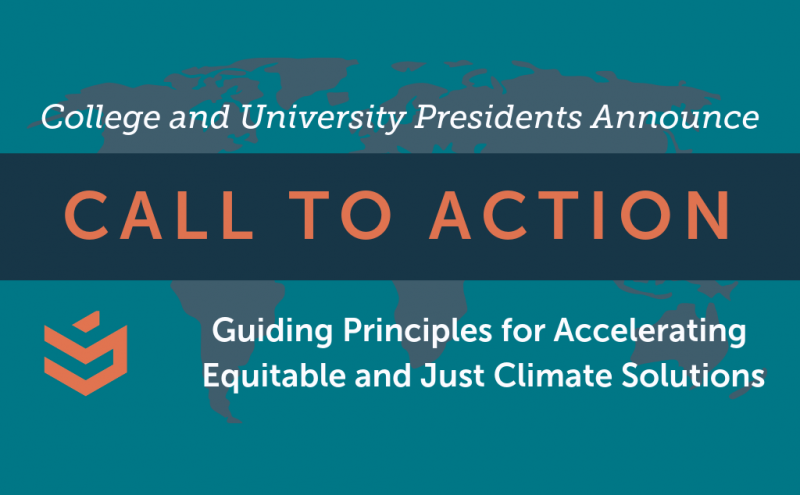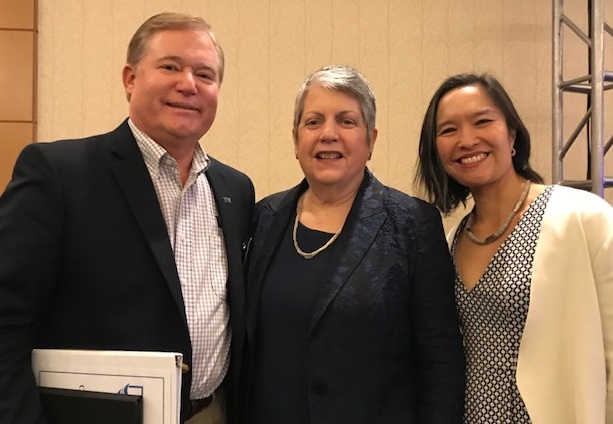Share this Story
President Miller, Higher Ed Leaders Call for Acceleration of Equitable and Just Climate Solutions
Institutions signal for ambitious solutions that advance sustainability practices on campuses and their surrounding communities
 University News | February 12, 2019
University News | February 12, 2019
Today in Tempe, Arizona, Virginia Wesleyan University President Scott D. Miller, together with higher education leaders across the country, announced a Call to Action: Guiding Principles for Accelerating Equitable and Just Climate Solutions in response to the recent scientific reports that strongly advise unprecedented action in the next decade to avoid the worst impacts of climate change. Institutions are signaling for ambitious cross-sector climate solutions that advance just and equitable sustainability practices on campuses and their surrounding communities.
"The Generation Z students on our campuses today are the electorate of tomorrow," said Dr. Miller, "and they understand the imperative to act: 94 percent of them consider the environment to be one of our nation’s most important challenges. It’s up to our leaders in higher education and government to come together with our partners in the corporate and non-profit sector to take action before it’s too late."
 Developed in coordination with presidents, chancellors, and trustees from higher education institutions of the Climate Leadership Network, which Dr. Miller chairs, the joint declaration took place at the 2019 Higher Education Climate Leadership Summit, an annual event hosted by Second Nature and the Intentional Endowment Network (IEN). The call provides nine guiding principles for higher education institutions to accelerate climate leadership with socially inclusive initiatives and innovative cross-sector partnerships.
Developed in coordination with presidents, chancellors, and trustees from higher education institutions of the Climate Leadership Network, which Dr. Miller chairs, the joint declaration took place at the 2019 Higher Education Climate Leadership Summit, an annual event hosted by Second Nature and the Intentional Endowment Network (IEN). The call provides nine guiding principles for higher education institutions to accelerate climate leadership with socially inclusive initiatives and innovative cross-sector partnerships.
“The respected scientific community has shown us that the window of opportunity to act on climate change is narrow and it is now,” said Tim Carter, President of Second Nature. “That is why higher education leaders are calling for increased collective action amongst themselves and with other key players in business, government and local communities to create the kind of transformative, just solutions that match the scale of the environmental challenges at hand.”
A pledge to enhance climate action on and among campuses
The call to action exhorts increased collaboration between colleges and universities that have already been leading on bold climate action commitments and initiatives for decades. By sharing resources and best practices, institutions can strengthen their climate action plans to incorporate cutting-edge research for decarbonizing operations and financing renewable energy projects. These sustainable practices include: new approaches to building performance and greenhouse gas reduction; implementing high-impact renewable energy projects; carbon pricing and offset methods; and endowments investing for a low-carbon, sustainable economy.
“The investment community in increasingly recognizing the risks and opportunities that climate change and other sustainability factors pose to portfolios,” said Georges Dyer, co-founder and principal of IEN. “As purpose-driven institutions with a long-term perspective, higher ed endowments are uniquely positioned to advance successful investment strategies that support progress towards science-based climate and sustainability goals, aligned with the Paris Climate Agreement and Sustainable Development Goals.”
A pledge to accelerate cross-sector collaboration and community engagement
Cross-sector collaboration allows institutions to apply their state-of-the-art research, resources and expertise to local communities for climate resilience strategies in partnership with cities, states, businesses and other stakeholders. The guiding principles encourage higher education institutions, from liberal colleges to international institutions, to catalyze collaboration between campuses and their surrounding communities to prepare for the impacts of changing environmental circumstances.
“Universities and colleges have a fundamental responsibility to develop solutions for the future of our planet,” said Arizona State University President Michael Crow. “We also have responsibility for educating our future political, business and social leaders. As we move forward, we need to work together and share what we know works. We need to work at scale and face the challenges of climate change together.”
Guidance and insight is available from the University Climate Change Coalition (UC3), now a cohort that has grown to 18 leading research universities since its launch at the 2018 Summit. UC3 has created a prototype for convening sectors to facilitate open exchanges of ideas and applied academic initiatives in support of local communities’ climate goals that can be applied at campus locations across the states and abroad.
A pledge to incorporate justice and equality
Colleges and universities have expanded to integrate offices of community engagement, offices of sustainability and offices of racial and gender equity, providing the groundwork to foster a just transition. As anchor institutions and engaged members of local communities, many institutions are acknowledging their responsibility to drive solutions that serve all, especially those who are disproportionately impacted by the effects of climate change.
Now is a pivotal moment for higher education to escalate collective action for transformative, scalable climate solutions that integrate environmental justice and social equity at their core. The participants of the 2019 Summit and the endorsers of the Call to Action are at the forefront of advancing the innovative partnerships between campuses, communities, businesses, and investors that are needed to enact such solutions.
###
About Second Nature
Second Nature is committed to accelerating climate action in, and through, higher education. This is accomplished by mobilizing a diverse array of higher education institutions to act on bold climate commitments, to scale campus climate initiatives, and to create innovative climate solutions. Second Nature aims to align, amplify, and bridge the sector’s efforts with other global leaders to advance urgent climate priorities.
About the Climate Leadership Network
The Climate Leadership Commitments are a signature program of Second Nature and include a Carbon Commitment (focused on reducing greenhouse gas emissions), a Resilience Commitment (focused on climate adaptation and building community capacity), and a Climate Commitment that integrates both. The Climate Leadership Network comprises almost 600 colleges and universities in every state and the District of Columbia who have committed to take action on climate and prepare students through research and education to solve the challenges of the 21st century. Learn more at secondnature.org.
About the Intentional Endowments Network
The Intentional Endowments Network is a non-profit, peer-learning network advancing intentionally designed endowments – those that seek to enhance financial performance by aligning investments with institutional mission, values, and sustainability goals. Working closely with leading organizations the network engages leaders and key stakeholders from higher education, foundations, business, and nonprofits. It provides opportunities for learning and education, peer networking, convening, thought leadership and information exchange around a variety of strategies (e.g., ESG integration, impact investing, and shareholder engagement) across asset classes.

